
A jazz pianist and a wisecracking journalist are pulled into a complex web of mystery after the former witnesses the brutal murder of a psychic.
You have been watching DEEP RED, directed by Dario Argento
End credit of the film
“Deep Red may appear to be a more violent and bloodier film, but this is not true because the film was a nightmare, so all the facts were exaggerated; all these facts were present in my other films.”
Dario Argento1
“Whereas Argento’s earlier films provide verbal answers undermined by images, Deep Red provides only images, and the total abandonment of the verbal in favor of the visual completes Argento’s transition to a rhetoric of aesthetic authority. (...) Deep Red ends with a freeze-frame on a spectacle: a pool of blood in which Marcus sees his own reflection. Credits roll over the image, beginning with a note to the audience, ‘You have been watching DEEP RED, directed by Dario Argento,’ a closing self-reference that is a hallmark of some of Argento’s greatest films. The note reflects the audience’s activity in the same way that the pool of blood, a metaphor for the entire film as a bloody spectacle, reflects Marcus. Deep Red foregoes end-of-film explanation entirely, emphasizing instead what for Argento is far more important than sense-making: the act of looking at a spectacle of violence.”
L. Andrew Cooper2

